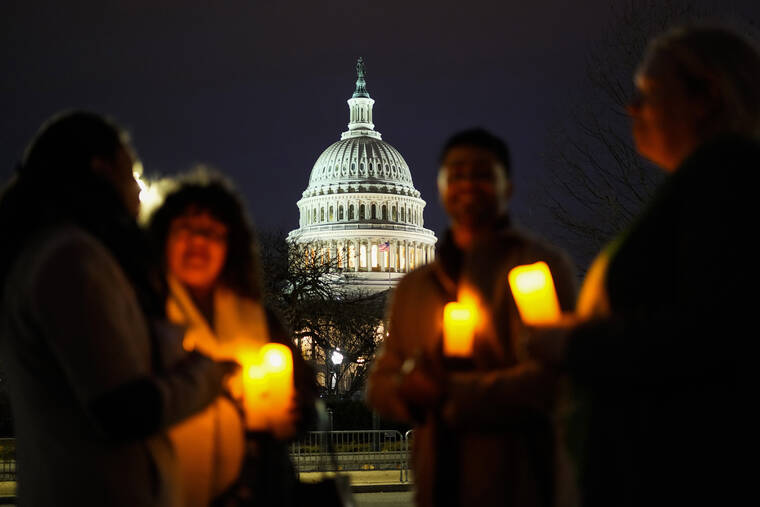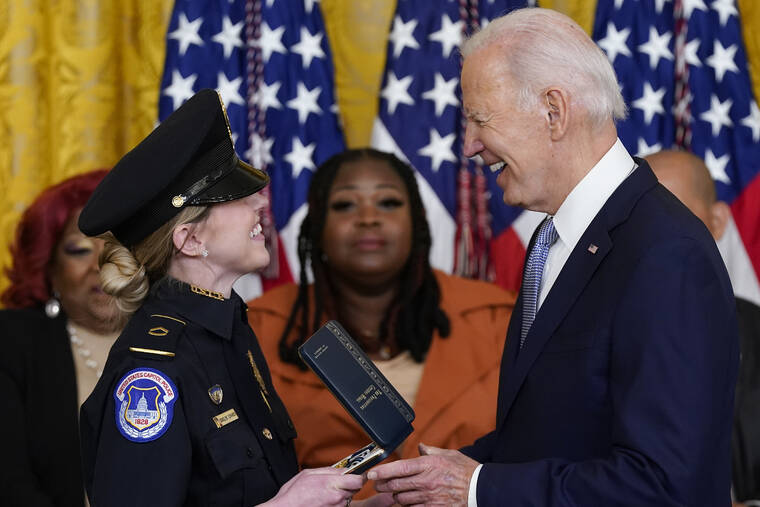WASHINGTON — President Joe Biden conferred high honors Friday on those who stood against the Jan. 6 Capitol mob two years ago and the menacing effort in state after state to upend the election, declaring “America is a land of laws, not chaos,” even as disarray rendered Congress dysfunctional for a fourth straight day.
Democrats at both ends of Pennsylvania Avenue commemorated the police officers attacked that day and the local election workers and state officials who faced fierce intimidation from supporters of former President Donald Trump, who fought to keep him in office after his defeat.
“Our democracy held,” Biden said in awarding Presidential Citizens Medals to about a dozen recipients from across the country in the White House East Room. “We the people did not flinch.”
Yet democracy’s vulnerability was equally on display at the Capitol as Republicans struggled to break their stalemate over the next House speaker, leaving that chamber in limbo for what should have been the first week under a GOP majority.
A resolution to the immediate crisis may be near as GOP leadership continued negotiations to appease its hard-right flank. Rep. Kevin McCarthy flipped more than a dozen colleagues to support him in his quest to lead the chamber, finally showing progress but still short of a majority.
Friday morning’s moment of silence at the Capitol to commemorate the Jan. 6, 2021, assault on it drew mostly Democrats, with brief remarks from Democratic leaders past and incoming — Reps. Nancy Pelosi and Hakeem Jeffries — and none from the GOP.
The event was focused on the Capitol Police officers who protected the building that day and families of law enforcement officers who died after the riot. Jeffries said 140 officers were seriously injured and “many more will forever be scarred by the bloodthirsty violence of the insurrectionist mob. We stand here today with our democracy intact because of those officers.”
At the White House ceremony, Biden described the violence in evocative and at times graphic detail — the officer speared by a flagpole flying the American flag, the beatings, the bloodshed and racist screams from rioters who professed to be pro-law enforcement as they overran police and hunted for lawmakers.
“Sick insurrectionists,” he said. “We must say clearly with a united voice that there is no place … for voter intimidation or election violence.”
Although the horrors of that day came down on members of both parties, it is being remembered in a largely polarized fashion now, like other aspects of political life in a divided country.
Biden, in his afternoon remarks, played up the heroism of the honorees, whether in the face of the violent Capitol mob or the horde of Trump-inspired agitators who threatened election workers or otherwise sought to overturn the results.
But he couldn’t ignore warning signs that it could happen again.
In the midterms, candidates who denied the outcome of 2020’s free and fair election were defeated for many pivotal statewide positions overseeing elections in battleground states, as were a number of election deniers seeking seats in Congress.
Yet many of the lawmakers who brought baseless claims of election fraud or excused the violence on Jan. 6 continue to serve and are newly empowered.
Trump’s 2024 candidacy has been slow off the starting blocks, but his war chest is full and some would-be rivals for the Republican presidential nomination have channeled his false claims about the 2020 race.
As well, several lawmakers who echoed his lies about a stolen election at the time are central in the effort to derail McCarthy’s ascension to speaker — unswayed by Trump’s appeals from afar to support him and end the fight.
The protracted struggle leaves the House leaderless, unable to pass bills and powerless to do much more than hold vote after vote for speaker until a majority is reached. Everything from national security briefings to helping their constituents navigate the federal bureaucracy is on pause because the members-elect can’t yet take their oath of office.
Some Democrats see a throughline from Jan. 6.
The chaos of the speaker’s election “is about destruction of an institution in a different way,” said Democratic Rep. Pramila Jayapal of Washington, one of the lawmakers who fled the rioters two years ago.
Then, the insurrectionists trapped some lawmakers in the House chamber but never breached it. They held up national business for hours that day.
Now some have felt trapped in the same chamber by the repeated, fruitless votes for speaker and House business is held up for this week and perhaps longer.
“The stream of continuity here is extremism, elements of Trumpism, norms don’t matter,” says Democratic Rep. Mike Quigley of Illinois. “It’s not about governing, it’s about pontificating and advocating an extremist point of view.”
Democratic Rep. Annie Kuster of New Hampshire said, “It is a very small minority who want to throw this institution into chaos.”
At least nine people who were at the Capitol on Jan. 6, 2021, died during or after the rioting, including a woman who was shot and killed by police as she tried to break into the House chamber and three other Trump supporters whom authorities said suffered medical emergencies.
Two officers, Howard Liebengood of the Capitol Police and Jeffrey Smith of the Metropolitan Police, were at the Capitol that Jan. 6 and died by suicide in the days following the attack. Biden honored both Friday with posthumous medals.
A third officer, Capitol Police Officer Brian Sicknick, collapsed and died after engaging with the protesters. A medical examiner later determined he died of natural causes.
The Metropolitan Police announced months later that two more of their officers who had responded to the insurrection, Kyle DeFreytag and Gunther Hashida, had also died by suicide.
On Capitol Hill, the mostly Democratic lawmakers held a 140-second moment of silence in honor of those officers as some of their families said their names and a bell was rung in their honor.
“I wish we didn’t have to be here,” said Ken Sicknick, brother of Brian Sicknick, after the ceremony.
After the unsatisfying midterm election for Trump allies, the House committee investigating the Jan. 6 attack wrapped up its work with a recommendation to the Justice Department to prosecute the former president. A special counsel and ultimately Attorney General Merrick Garland will now decide whether to indict him.
While the congressional investigations have ended, the criminal cases are still very much continuing, both for the 950 arrested and charged in the violent attack and for Trump and his associates who remain under investigation. The second seditious conspiracy trial begins this week, for members of the far-right Proud Boys.
In a measured but significant step, Congress in December amended the Electoral Count Act to limit the role of the vice president in counting electoral votes, to make it harder for individual lawmakers to mount objections to properly certified election results and to eliminate “fake electors” like those deployed by Trump allies in a bid to overturn his defeat to Biden.
After all that, Biden, who made it a tentpole of his agenda to prove to the world that democracies can deliver for their citizens, said he hoped that this was “the first time we’re really getting through the whole issue relating to Jan. 6. Things are settling out.”
But then came the fight for speaker, rare in the annals of Congress.
“And now, for the first time in 100 years, we can’t move?” Biden said earlier this week. “It’s not a good look. It’s not a good thing.”
“Look,” he went on, “how do you think it looks to the rest of the world?”


